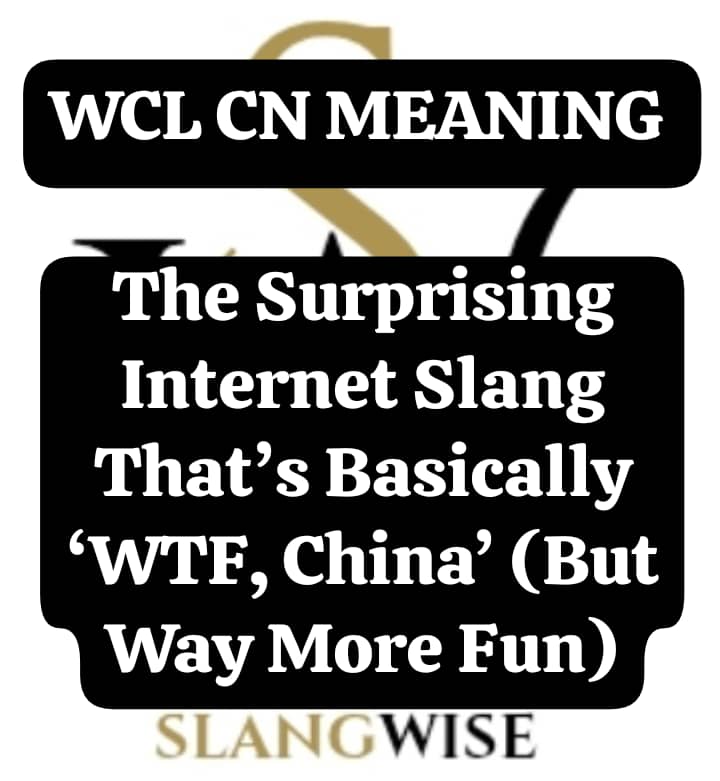Picture this: You’re scrolling through a heated comment thread or jumping into a gaming lobby, and suddenly someone drops “WCL CN.” At first, it hits like a random code—three letters plus a country tag that packs a punch.
But once you crack it, you start noticing it everywhere: in memes, quick replies, even on custom stickers. It’s that raw, speedy way to react to something mind-blowing tied to China, blending shock with a dash of awe or sarcasm.
In this piece, you’ll get the full rundown on what WCL and WCL CN really stand for, where they popped up from, how to weave them into your chats (with spot-on examples), and when to hold back so you don’t accidentally step on toes.
Table of Contents
In A Nutshell
- WCL boils down to 卧槽了 (wò cáo le): a go-to exclamation that’s like yelling “WTF” or “damn” when life’s got you reeling.
- WCL CN mashes that up with CN (short for China) to amp up reactions to China-linked surprises, from tech wizardry to wild news drops.
- The vibe shifts with context: You could mean pure amazement, a bit of annoyance, or straight-up jokes, it’s all in how you play it.
- Drop it in casual spots like group texts or social feeds, but steer clear of work emails or touchy talks where it might land wrong.
What Does WCL Mean?
Simply, WCL is your shortcut for 卧槽了, a staple in Chinese online lingo that captures that gut-punch moment of surprise or frustration. Think of it as the English equivalent of blurting out “WTF!” or “Holy crap!”.
It’s not polite dinner-table talk, but it’s perfect for the chaos of the internet. No fancy translations needed; it’s all about the energy, that quick burst to say, “Hold up, what just happened?”
WCL CN Meaning
Now, when you add CN to make it WCL CN, you’re zeroing in on China as the spark. Maybe you’ve just watched a clip of a massive factory robot assembling cars at warp speed, or caught wind of a quirky new law rolling out overnight. Your reply? “WCL CN.”
It’s like shorthand for “Mind blown – China’s at it again!” You get the efficiency: four letters to sum up a whole rollercoaster of feelings, tied to a global hotspot that’s always stirring the pot.
Read Also: The secret language of Pilots – Discover, 30 pilot slangs and phrases that will take you sky high.
A Little Origin of WCL
WCL’s got a solid backstory that shows how everyday talk evolves into digital gold. Back in spoken Chinese, 卧槽 (wò cáo) started as a casual interjection, something you’d mutter under your breath when a bike cuts you off in traffic or a plot twist blindsides you in a show.
It’s got that gritty edge, like a milder swear that’s more about venting than outright cursing.
Fast-forward to the online world, and things speed up. Typing full characters takes time, especially on mobile, so folks started chopping them down to initials: 卧槽了 becomes WCL.
It’s a classic hack, same as how LOL turned “laughing out loud” into a reflex or BRB made “be right back” a non-issue.
Add CN, the universal tag for China (think .cn domains or quick country refs in forums), and boom: WCL CN is born. It’s not from some viral tweet or meme factory; it bubbled up organically in Chinese chat apps like WeChat or QQ, then leaked out to global platforms like Twitter (or X, if you’re keeping score) and Discord.
You see this pattern everywhere in internet culture. Slang loves to compress big emotions into tiny packages because, truth be told, who has time for paragraphs when a notification pings? WCL CN fits right in, crossing borders effortlessly.
Chinese users export the core exclamation, English speakers latch onto the WTF vibe, and suddenly it’s a bridge between worlds. Next time you’re in a cross-cultural group chat, you’ll spot how these shortcuts build that instant connection, or spark a laugh when someone misreads it as a sports acronym.
How to Use WCL and WCL CN (Real Examples to Try)
Definitions are one thing, but seeing it in action? That’s where you really get the hang of it. You’ll pick it up fastest by imagining your own scenarios, then testing them out.
Here are a few everyday spots where WCL shines, pulled from chats that feel ripped from real life. Feel free to swap in your details and run with them.
- Start with pure awe. Your buddy shares a TikTok of a high-speed train in China zipping through mountains like it’s defying physics. You hit back: “WCL CN – that suspension tech is unreal. How do they even build that?” See? It’s admiration wrapped in shorthand, inviting more talk without overdoing it.
- Or flip to frustration in a news feed. An article pops up about supply chain drama hitting your favorite gadget brand, all traced back to a hiccup in Shenzhen factories. Your knee-jerk: “WCL. Prices are gonna skyrocket now.” No CN needed here, it’s the standalone WCL carrying the “damn, this sucks” weight. Pair it with a facepalm emoji, and you’ve nailed the exasperated tone.
- Gaming’s a goldmine for this too. You’re in an esports stream, and a Chinese squad in League of Legends pulls a comeback from what looks like certain doom, flawless team fight, stolen baron, the works. Chat explodes: “WCL CN! That midlaner’s mechanics are god-tier.” It’s celebratory, almost reverent, turning a solo watch into a shared hype moment. You could even use it ironically if your own team’s fumbling: “Our supports just fed the enemy—WCL CN vibes over here, but make it tragic.”
- Don’t sleep on sarcasm either. Scrolling Reddit, you stumble on a thread about bizarre street food trends, like scorpion skewers on a stick from a Beijing night market. Someone’s hyping it; you counter: “WCL CN… pass the plain rice, thanks.” The ellipsis adds that eye-roll flavor, keeping it light but pointed. Or in a travel group, debating visa rules: “New entry requirements dropped today? WCL. Summer plans officially toast.”
- The beauty? You control the spin. Throw in exclamation points for hype (“WCL CN!!!”), questions for curiosity (“WCL CN? Spill the deets”), or caps for max drama (“WCL THAT WAS EPIC”). Emojis seal the deal—a shocked face for surprise, fire for impressive, skull for “I’m dead” laughs. Practice in low-stakes spots first, like replying to a friend’s story, and watch how it flows. Before long, you’ll be the one dropping WCL CN like a pro, making your reactions pop without typing a novel.
- One more angle: pop culture tie-ins. Bingeing a K-drama with heavy China cameos? When the plot veers into espionage territory: “WCL CN plot armor is thick AF.” Or music drops, a viral track from a Shanghai producer blending trap with erhu: “Just heard that new beat. WCL CN, fusing cultures like a boss.” These keep it fresh, showing how WCL adapts to your world.
Read more: Hip-hop Slang: 20 Terms That Defined a Genre (And Changed the World) Get the lowdown on the lingo that powers hip-hop’s beats.
When to Avoid WCL
Slang’s fun until it flops, right? You know the drill, timing and crowd make all the difference. WCL packs heat because it’s got that expletive undercurrent; it’s not “gosh darn” polite.
In a job interview Slack or emailing your boss about deadlines? Skip it. “WCL, traffic was brutal” might get a chuckle from pals, but it could paint you as too casual (or worse) in pro circles.
Layer on the CN, and sensitivity levels up. China’s a powerhouse in tech, culture, and headlines, so WCL CN can swing from “respectful wow” to “edgy jab” depending on delivery.
If you’re poking fun at stereotypes, like traffic jams or knockoff trends, it might rub folks the wrong way, especially in diverse groups where nationality hits close to home.
Ever seen a thread derail over a “harmless” joke? Yeah, tone’s the silent killer. Read the room: If the convo’s heated on politics or history, dial it back. Opt for neutral “Whoa, that’s wild” instead.
Global chats add another twist. Not everyone’s fluent in the nuances, so a non-Chinese speaker might puzzle over WCL like it’s hieroglyphs. Explain if it fits, or just ease in with context: “WCL CN (think WTF for that insane drone show).”
And culturally? In spots where swearing’s taboo, like family groups or certain forums, it’s a no-go. Better safe than sorry, save the spice for spaces where everyone’s on the same wavelength.
Bottom line: You wield the power. Use WCL to bond and banter, but pause if it risks alienating. It’s slang, not a sledgehammer.
Final Thoughts
There’s something electric about how a few letters like WCL can light up a screen, right? They squeeze raw feeling into pixels, turning a blank reply into a spark.
WCL CN takes it further, a nod to one country’s hustle, wrapped in universal shorthand that anyone with a keyboard can grab. It’s proof of how the web mashes cultures: A Beijing back-alley quip goes viral in LA, and suddenly you’re all speaking the same clipped language of surprise.
You might not adopt it overnight, but give it a spin. Craft a quick story on your feed: “Raced through a rainy commute, dodged a pothole apocalypse, WCL, city life’s a thriller.” Or caption a pic of your latest gadget haul: “Unboxed this beauty.
WCL CN engineering for the win.” Gauge the replies; they’ll tell you if it’s clicking. Remember, slang thrives on play, twist it, test it, own it. Just let context call the shots, and you’ll land those moments where words (or letters) hit just right.
In a world drowning in noise, stuff like WCL CN cuts through. It’s messy, it’s quick, it’s human. Next time China drops a headline that stops you cold, a moon base update or a flavor-bomb snack trend, reach for it.
You’ll feel that rush of connection, the kind that makes online feel less like scrolling and more like sharing secrets. Go on, try it. The internet’s waiting for your take.

